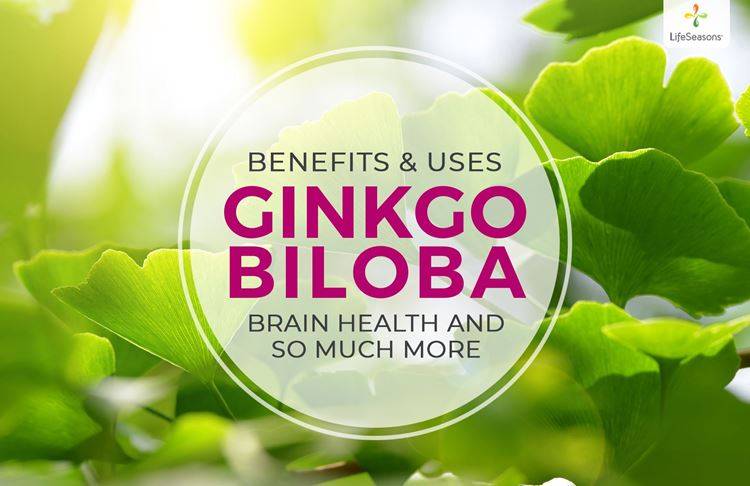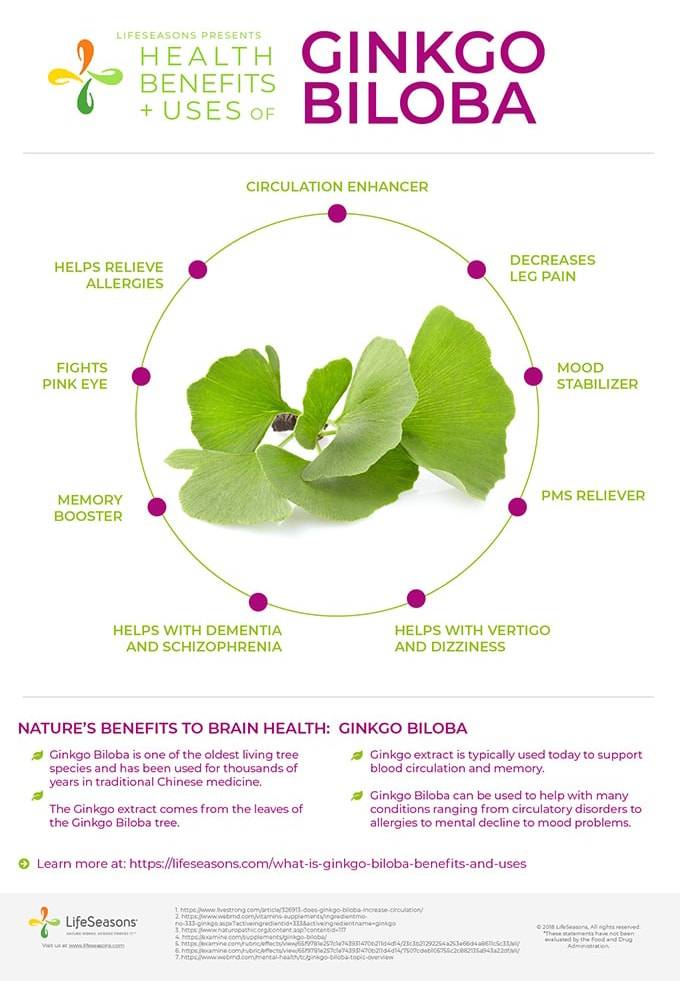Not only is Ginkgo Biloba a fun name to say, it’s becoming a famous memory-enhancer supplement here in the U.S. Along with its reputation of promoting brain health, Ginkgo Biloba has many other amazing benefits that you may not know about.
In this blog article you’ll learn what Ginkgo Biloba is, how this ingredient supports brain health and blood circulation, and lastly, you’ll learn about the benefits and uses of this herb.
Ginkgo Biloba – What is it?
Ginkgo Biloba is one of the oldest living tree species and has been used for thousands of years in traditional Chinese medicine. The Ginkgo extract comes from the leaves of the Ginkgo Biloba tree, and it’s the extract that is typically used today to support blood circulation and memory.
10 Ginkgo Biloba Benefits & Uses: Health Conditions Helped by Ginkgo Biloba
Ginkgo Biloba has a vast array of benefits and can be used for many conditions ranging from circulatory disorders to allergies to mental decline to mood problems. Just take a look at this list; you may be surprised to learn all the wonderful things Ginkgo Biloba can do.
- Circulation Enhancer – According to the National Institutes of Health, most of Ginkgo Biloba’s medicinal effects are due to its effectiveness as a circulatory enhancer; compounds in the Ginkgo leaf appear to dilate blood vessels, thereby increasing blood flow to the legs, ears, eyes, and brain. 1
- Decreases Leg Pain – If you have leg pain when walking due to poor blood flow, Ginkgo Biloba could provide relief. Some evidence shows that taking the Ginkgo leaf extract increases the distance people with poor blood circulation in their legs can walk without pain. 2 However, those with this condition may need to take Ginkgo for at least 24 weeks before they see improvement. 2
- Helps Relieve Allergies – Ginkgo Biloba contains bioflavonoids, which are a natural antihistamine and strongly anti-allergenic, and Ginkgo Biloba is used as an antioxidant and anti-inflammatory, and this means that those annoying allergies could be a thing of the past. 3
- Fights Pink Eye – Eye drops containing an extract of Ginkgo Biloba appear to be effective in reducing the allergic symptoms of pink eye (aka conjunctivitis) more than a placebo treatment. 4
- Memory Booster – Research suggests Gingko can improve memory, speed of thinking, and attention in healthy adults, and that there is an increase in short-term memory and recall in older individuals (55+ years). 2,4
- Helps with Dementia – Some evidence shows that taking the Ginkgo leaf extract by mouth modestly improves symptoms of Alzheimer’s, vascular, or mixed dementias. 2 However, there are concerns that findings from many of the early Ginkgo studies may not be reliable. Although most clinical trials show Ginkgo helps symptoms of Alzheimer’s disease and other dementias, there are some conflicting findings, suggesting it may be hard to determine which people might benefit. 2
- Mood Stabilizer – Feeling anxious? Research has shown that taking Ginkgo Biloba for 4 weeks can reduce symptoms of anxiety. 2,4 Feeling stressed out? Ginkgo Biloba has been known to reduce blood pressure and cortisol levels (cortisol is a hormone your body releases when you’re under stress). 5
- Helps with Vertigo and Dizziness – Taking the Ginkgo leaf extract by mouth seems to improve symptoms of dizziness and balance disorders. 2
- PMS Reliever – There appear to be reductions in the symptoms of PMS, such as breast tenderness, when Ginkgo Biloba is taken – up to a 23% reduction. 2,4
- Helps with Schizophrenia – Research shows that taking Ginkgo daily in addition to conventional antipsychotic medications can reduce symptoms of schizophrenia. It may also reduce adverse effects associated with the antipsychotic medication, haloperidol. 6
Ginkgo Biloba Side Effects & Awareness Tips
Most literature states that Ginkgo Biloba is safe with just a few mild side effects. If you ever happen to be around a Ginkgo Biloba tree, be aware that direct contact with the pulp could cause a skin reaction similar to poison ivy. 7 But, this really isn’t something you need to worry about because this type of reaction should not occur with Ginkgo that is taken through oral supplements. Keep in mind, though, that if you have a natural allergy to the Ginkgo extract, you may experience a mild to moderate allergic skin reaction. 2,7
Common Ginkgo Biloba side effects include: 1,2
- Stomach upset
- Headaches
- Dizziness
- Constipation
- Forceful heartbeat
- Increase in risk of bruising
Increased bleeding According to WebMD, the only major complication that has been linked to the use of Ginkgo is bleeding problems; therefore, Ginkgo is not recommended for people who have blood disorders or are taking medication to thin their blood, such as warfarin, aspirin, or NSAIDs. 7
If you’re pregnant or nursing, speak with your doctor to find out if Ginkgo Biloba is appropriate for your use.
Learn More about Ginkgo Biloba and other helpful Ingredients that Help Brain Health
We often take for granted the health of our brain, yet without a healthy brain, we won’t be able to effectively function as ourselves. Incorporating exercise for your body and brain, plus getting a good night’s sleep, will certainly prove beneficial to your overall brain health.
If Ginkgo Biloba in regards to ingredient knowledge has piqued your interest for more information, here are some links where you can feed your curiosity:
- More about Ginkgo Biloba from LifeSeasons’ Ingredients Science Library.
- Learn Natural Ways to Improve Brain Health.
- Discover more of LifeSeasons’ Natural Remedies and Ingredients by visiting our blogs.
It’s exciting to think about all the benefits of Ginkgo Biloba, especially in regard to brain health!
We’d love for you to share any insights and tips you have about Ginkgo Biloba, how you use the supplement, and how it helps you with blood flow and brain health, if not more. Share with the LifeSeasons community and support our belief that knowledge is power and our community our life source.
Feed Your Curiosity
If you want to be the first to know about new posts on our blog, join our email list to receive updates with helpful tips for living a healthy life.
Vinpocetine References:
1. https://www.livestrong.com/article/326913-does-ginkgo-biloba-increase-circulation/
2. https://www.webmd.com/vitamins-supplements/ingredientmono-333-ginkgo.aspx?activeingredientid=333&activeingredientname=ginkgo
3. https://www.naturopathic.org/content.asp?contentid=117
4. https://examine.com/supplements/ginkgo-biloba/
5. https://examine.com/rubric/effects/view/65f9781e257c1e743931470b211d4d14/23c3b21292254a253e66d4a8611c5c33/all/
6. https://examine.com/rubric/effects/view/65f9781e257c1e743931470b211d4d14/7507cdeb105755c2c882135a943a22df/all/
7. https://www.webmd.com/mental-health/tc/ginkgo-biloba-topic-overview











